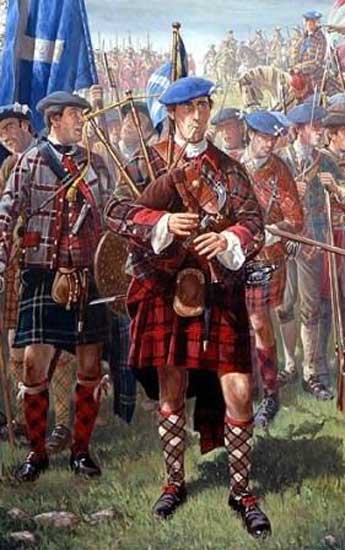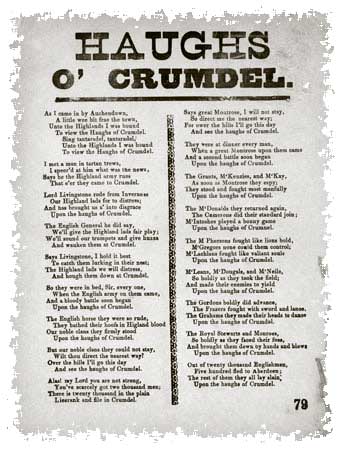THE BATTLE OF CROMDALE 1690 |
 |
The Battle of Cromdale took place at the Haugh of Cromdale in Speyside on April 30 and May 1, 1690. Despite being a relatively minor encounter, this battle marked the effective end of the Jacobite rising. After their defeat at the Battle of DUNKELD in 1689, the Highland clans had returned to their homes in low spirits. Sir Ewen Cameron assumed control over the army's remnant. Sir Ewen and the other Jacobite chiefs complained to King James over the precarious state of his support in Scotland, and the necessity of sending them aid. Unfortunately, James was occupied with preparations for resisting a threatened invasion of Ireland. To aid his supporters in Scotland, James sent clothing, arms, ammunition and provisions. He also directed a few Irish officers to Lochaber, among whom was Major-General Buchan, as commander-in-chief of the Jacobite forces in Scotland. On Buchan’s arrival, a meeting of the chiefs and principal officers was held at Keppoch to formulate a plan of action. While some of the clans proposed to submit to the government, this proposition was resisted by Sir Ewen. The meeting unanimously resolved to continue the war, but not until the labors of the spring season were complete in the Highlands. The large scaled muster of the clans was postponed. In the mean time a detachment of 1,200 infantrymen was to be placed at Buchan's disposal, to weaken the enemy’s quarters along the borders of the Lowlands. General Buchan advanced his men through Badenoch, intending to march down Speyside into the Duke of Gordons country, where he expected to muster additional forces. Due to desertion, Buchan’s force had dwindled to 800 men. Ignoring counsel from his Scottish officers, to not advance past Culnakill, Buchan marched down the Spey as far as Cromdale, where he encamped on the last day of April. |
He was met at Cromdale by a larger government force under Sir Thomas Livingston, commander of the garrison of Inverness. As Livingston approached with his men, on the opposite bank of the Spey, the Jacobite forces started to retreat. Livingston's cavalry crossed the river and intercepted the Jacobites, who made a brief stand at the foot of the hill of Cromdale. Fortunately for the outnumbered Jacobites, a thick fog came down the side of the mountain and enveloped them, compelling Livingston to discontinue the pursuit. According to reports, the Highlanders had 400 men killed and taken prisoners. Livingston's losses were reported as between none and 100 killed. |
The loyal Stewarts, with Montrose, So boldly set upon their foes, And brought them down with Highland blows Upon the Haughs of Cromdale. Of twenty-thousand Cromwell's men, Five-hundred fled to Aberdeen, The rest of them lie on the plain, Upon the Haughs of Cromdale. |
| Strangely, the hero of the song, James Graham, 1st Marquess of Montrose, died forty years before the battle took place. The tune has remained popular, and is still played by pipe bands. It is also a very popular song on the folk circuit, it is a splendid example of Jacobite spin - the ballad writer took two battles and with little regard for truth produced this partisan song. The first was the Battle of Auldearn in May 1645, a victory for Montrose, and the second the ignominious defeat of the Jacobites under Colonels Cannon and Buchan at Cromdale in 1690. Not only did the songwriter run together incidents forty-five years apart but neatly reversed the events so that the song ends with a Jacobite victory. Another version of the song is to be found in the 'The Rebel Ceilidh Song Book', published by Angus McGillveray, under the title 'Haughs o' Cromdale' |
 |
 |
© Paisley Tartan Army 2008-09
